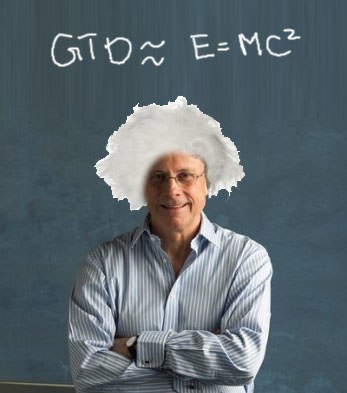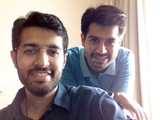A GTD Times community contribution by Arif and Ali Vakil
What made Einstein an Einstein or Newton a Newton? It was their amazing capability to look at what everybody was looking at, but see something different. The world sees an apple falling from a tree, but Newton notices there’s something greater at work here–it’s gravity. The world sees sunrise, sunset and umpteen other relationships with time and light throughout the day. Einstein looks and realizes that it’s not time that’s a constant, but it’s the speed of light. Similarly the whole world is involved getting stuff done, but David Allen sees through the clutter and comes up with best-practices, called “GTD”.

We’ve made a list of some amazing observations we feel give GTD its ‘chutzpah’. The brilliant thing about all these observations is that every one of us is coming across these at least several times every single day of our lives and any one of us could have figured it out. Be it psychologists with PhD degrees or masters in other fields, nobody captured it like David Allen. Gosh how life changing these practices have been.
The Next Action:
What a remarkable observation. That to move forward on any item, all you need is a Next Action. That’s it. One can only do a Next Action. We make calls (@Calls), complete errands (@Errands), speak to people (@Agenda) and do stuff on our computer (@Computer). All through our lives we’ve always been doing Next Actions, but perhaps never figured out to think in terms of Next Actions.
David takes his observation further. The fact that Next Actions can most be categorized in approximately 5 categories or so, is an amazing piece of insight. And, top it all off to notice also that there are so many Next Actions that don’t take longer 2 minutes, is pure genius.
(Note: David has often given the credit of the Next Action thinking to Dean Acheson.)
There is potential stress as soon as we receive something:
You can’t see it–it’s so very subtle–but it’s there. As soon as an email, voicemail or a piece of paper (even if it’s a cute little greeting card) enters my life, so does potential stress. And I never consciously noticed it. Ever. It’s when I began practicing GTD and began either completing or renegotiating my commitments that I realized oh the burden I was under. I always had it. Hey, c’mon, we all always had it. But we never noticed it. But thank God David did, and man life has been rosier since.
Writing down stuff, gives instant relief:
So how do you get rid of stress in life by the various commitments? Is it by doing them? Not necessarily. Why take all that trouble? Just write it down. That’s it. Imagine that. Just by writing down you begin to feel so much better. Once again throughout lives we have at some point or the other have written stuff down and immediately felt that instant relief, but never questioned why that happened. David did, and realized that stress comes because of our agreements we break with ourselves (another brilliant observation) and the simple act of writing it down we’re actually clarifying the agreement with ourselves and that’s the key to eliminating stress from our lives.
Priorities are at six different levels, Three-fold Nature of Work and the Limiting Criteria:
Since we were born we have been prioritizing. We all had to choose whether it’s sleep we want now or milk. Of course, our needs got more complex, but unfortunately our prioritizing system may never have been upgraded to keep pace. We simply gave one task more priority over another in a simple list kind of way. But that’s not the way the world works, that’s not how we are. Sometimes we’ve got a client screaming their head off on the phone, automatically that becomes a priority, that’s where David’s “Three-Fold nature of Work” comes in place. Other times, although it’s priority to finish a report, you just had 3 conference calls back to back and just don’t have the energy to do so. That’s when you can use David’s Limiting Criteria model and make ‘having a Latte at a Cafe’ a priority and not feel lousy about it. But all that’s fine only when you are moving towards your long term goals while fulfilling your vision and your purpose as human spirit on the planet, i.e. you’d be using David Allen’s “Horizons of Focus model” here.
Now, anyone of us could have figured that out. Hey, it’s really not rocket science. That’s exactly how we’ve been making priority decisions anyway. But we didn’t, yet David did so, and now it’s really so much easier to decide what’s important to do right now and what’s not.
There are probably more gems in GTD that we’ve missed. Have you noticed something in GTD that is so simple and obvious that anyone could have figured out, but hasn’t yet David Allen has. Do mention it in comments below.
Arif and Mohammed Ali Vakil are brothers and Directors at Vakil Housing, large real-estate development company based in Bangalore, India. Both Arif and Ali have been studying GTD for the past several years and have implemented GTD as a standard within their company–the first company in India to do so. Both are qualified chartered certified accountants and passionate bloggers. They are also certified graduates of the GTD Train-the-Trainer program.


there are deeper similarities